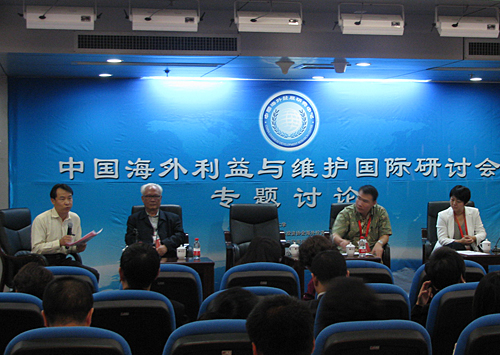|
 |
|
SAFETY MATTERS: Participants hold a discussion at a forum on safeguarding China's overseas interests in Xiamen, southeast China's Fujian Province, on November 24, 2014 (COURTESY OF HUAQIAO UNIVERSITY) |
In recent years, with more and more Chinese companies expanding overseas and more and more Chinese citizens living abroad, protecting their interests in foreign countries has become increasingly important.
A forum on how to safeguard China's overseas interests was held from November 23-24 at Huaqiao University in Xiamen, southeast China's Fujian Province. Over 30 government officials and researchers from Chinese universities and research institutes attended the forum.
Participants of the forum agreed that China's overseas interests covered a wide range of topics, including the safety of the lives and assets of overseas Chinese; China's political, economic and military interests abroad; and the safety of China's agencies and enterprises abroad.
In order to better protect the interests of Chinese people overseas, the China Overseas Development Research Center of Huaqiao University was founded on July 17. The center has constructed a safety incidents pre-warning and rescue system for overseas Chinese by collecting information from Chinese in different countries through the Internet.
"The center is aimed at providing services to overseas Chinese and Chinese companies," said Luo Keren, Director of the center.
Jia Yimin, President of Huaqiao University, told Beijing Review that as a university open to overseas Chinese, Huaqiao University has formed a close relationship with overseas Chinese and Chinese organizations, which will facilitate research on overseas Chinese.
The results of the first phase of the center's research have been published in the Bluebook of Overseas Chinese 2013. The research has found that serious emergency incidents involving overseas Chinese mainly happen in Africa, South America and Asia in the form of political riots, armed violence and crimes. The reasons for these conflicts vary from one place to another. For example, exclusion or even political purges are the most prevalent reasons in South Asian countries. In Europe, economic disputes constitute the main reasons for emergency incidents.
Recognizing the importance of protecting the interests of overseas Chinese, the Chinese Government has established various aid methods for the protection of such interests. For example, the Ministry of Foreign Affairs set up the Department of External Security Affairs in July 2004. On September 2, the ministry launched the Global Emergency Call Center for Consular Protection and Services. Through the "12308" hotline, the ministry can get to know the difficulties and needs of overseas Chinese citizens at any time and provide care and assistance for them when needed.
Aside from efforts from the government, overseas Chinese themselves also need to make efforts to protect their rights. Qiu Jin, a researcher with the Counselors' Office of the State Council, said that overseas Chinese should learn more about the history, culture and law of the countries they live in so as to better merge into local society and get along with local residents. Many misunderstandings between overseas Chinese and residents of the countries they live in are actually caused by lack of knowledge of each other's customs and culture, Qiu added.
(Reporting from Xiamen, Fujian Province) | 